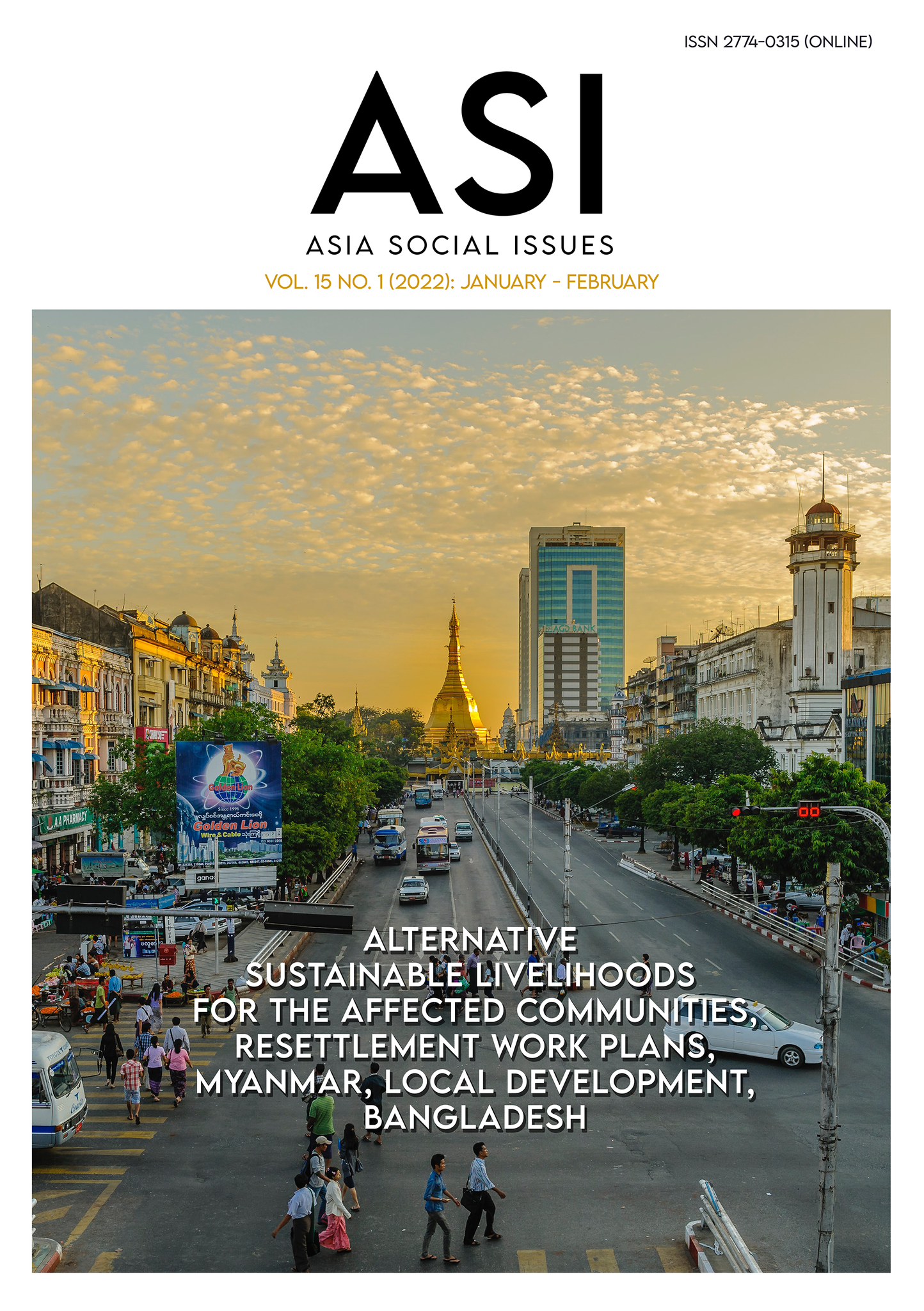Who are the Patani Peace Influencers? Exploring from Perspectives of Civil Society in Southern Thailand
Main Article Content
Abstract
This research explores local civil society organizations’ (CSOs) view on peace influencers in southern Thailand. Its key puzzle is, according to the CSOs, who are considered to be Patani Peace Influencers? Because there is a lack of reliable resources to support peacebuilding on key peacemakers, this project uses exploratory research to collect data from Buddhists and Muslims in southern Thailand. The exploratory survey was launched from January-May 2021; it received 59 nominees from 48 nominators. The dense ranking was used to generate the updated list of 10 peace influencers in Patani. The result unveils that the top three peace influencers include Ismail Lutfi Japakiya, Rukchart Suwan, and Srisompob Jitpiromsri, respectively. The list suggests that although non-religious actors have primarily been nominated, the most influential actor in the area remains the religious scholar.
Article Details
Copyright: CC BY-NC-ND 4.0
References
Abanggg. (2020). The best 12 in 2019. Retrieved from https://www.facebook.com/abangggcomics2021/photos/660116034526475
Awaeputeh, A. (2021). Role and findings from the works of Muslim Attorney Center Foundation. Retrieved from https://www.facebook.com/macmuslimfoundation/videos/1154437405006217
Buaban, J. (2020). Islamophobia as represented by Thai Buddhist organizations. Journal of Social Sciences, 50(2), 125-147.
Deep South Watch. (2021). Summary of incidents in Southern Thailand. Retrieved from https://deepsouthwatch.org/en/node/11973
Editorial. (2020). 10 New Gen Pukabklean Chaidantai [10 New Gen Influencers]. Life @ Chaidantai.
Esposito, J., & Kalin, I. (2009). The world’s 500 most influential Muslims, 2009. Amman: The Royal Islamic Strategic Studies Center.
Galtung, J. (1965). On the meaning of nonviolence. Journal of Peace Research, 2(3), 228-257.
Galtung, J. (1996). Peace by peaceful means: Peace and conflict, development and civilization (1st ed.). Oslo: London; Thousand Oaks, CA: SAGE Publications.
Galtung, J. (2011). Peace, positive and negative (pp. 1-5). In Christie, D. J. (Ed.). The encyclopedia of peace psychology. Oxford: Wiley-Blackwell.
Galtung, J., & Fischer, D. (2013). Positive and negative peace (pp. 173-178). In Galtung, J., & Fischer, D. (Eds.). Johan Galtung: Pioneer of peace research. Berlin, Heidelberg: Springer.
Kymlicka, W. (1996). Multicultural citizenship: A liberal theory of minority rights. Oxford University Press.
Lumbard, J., & Nayed, A. A. (2010). The world’s 500 most influential Muslims, 2010. Amman: The Royal Islamic Strategic Studies Center.
Pathan, D., Tuansiri, E., & Koma, A. (2018). Understanding anti-Islam sentiment in Thailand. Pattani: Patani Forum.
Putnam, R. D., Leonardi, R., & Nanetti, R. Y. (1994). Making democracy work: Civic traditions in modern Italy. Princeton: Princeton University Press.
Reychler, L. (2010). Peacemaking, peacekeeping, and peacebuilding. Retrieved from https://doi.org/10.1093/acrefore/9780190846626.013.274
Ropers, N. (2013). Govt must strive to build “positive peace” in South. Retrieved from http://www.bangkokpost.com/opinion/opinion/347484/govt-must-strive-to-build-positive-peace-in-south
Schleifer, A. (2011a). The world’s 500 most influential Muslims, 2011. Amman: The Royal Islamic Strategic Studies Center.
Schleifer, A. (2011b). The world’s 500 most influential Muslims, 2012. Amman: The Royal Islamic Strategic Studies Center.
Schleifer, A. (2012). The world’s 500 most influential Muslims, 2013/2014. Amman: The Royal Islamic Strategic Studies Center.
Schleifer, A. (2013). The world’s 500 most influential Muslims, 2014/2015. Amman: The Royal Islamic Strategic Studies Center.
Schleifer, A. (2014). The world’s 500 most influential Muslims, 2015. Amman: The Royal Islamic Strategic Studies Center.
Schleifer, A. (2015). The world’s 500 most influential Muslims, 2016. Amman: The Royal Islamic Strategic Studies Center.
Schleifer, A. (2016). The world’s 500 most influential Muslims, 2017. Amman: The Royal Islamic Strategic Studies Center.
Schleifer, A. (2017). The world’s 500 most influential Muslims, 2018. Amman: The Royal Islamic Strategic Studies Center.
Schleifer, A. (2018). The world’s 500 most influential Muslims, 2019. Amman: The Royal Islamic Strategic Studies Center.
Schleifer, A. (2019). The world’s 500 most influential Muslims, 2020. Amman: The Royal Islamic Strategic Studies Center.
Schleifer, A. (2020). The world’s 500 most influential Muslims, 2021. Amman: The Royal Islamic Strategic Studies Center.
Strategic Nonviolence Commission. (2018). Peace dialogue: Encounter violence in Southern border provinces, 1991-2011. Bangkok, Thailand: Strategic Nonviolence Commission.
Strategic Nonviolence Committee. (2016). International actors in the Southern borders’ deadly conflict: A preliminary observation. Bangkok, Thailand: Thailand Research Fund.
Suphunchitwana, P. (2018). The unfamiliarity and the resistance against mosques construction in Northern areas of Thailand. Songklanakarin Journal of Social Sciences and Humanities, 24(2), 3-33.
The World Bank and Patani Forum. (2018). Developing relationships between state and civil society in border areas. Pattani, Thailand: Prince of Songkla University.
The World Bank & United Nations. (2018). Pathways for peace: inclusive approaches to preventing violent conflict. Retrieved from https://openknowledge.worldbank.org/handle/10986/28337
Tocqueville, A. D. (1969). Democracy in America. New York: Anchor Books.
Tuansiri, E., & Koma, A. (2020). A fragile society: Buddhist-Muslims relations in Thailand in 2018-2019. Walailak Journal of Social Science, 13(1), 104-144.
Varshney, A. (2002). Ethnic conflict and civic life: Hindus and Muslims in India. New Haven: Yale University Press.
Yahprung, A. (2014). Islamic reform and revivalism in Southern Thailand: A critical study of the Salafi reform movement of Shaykh Dr Ismail Lutfi Chapakia Al-Fatani (from 1986-2010) (Doctoral dissertations). Kuala Lumpur, Malaysia: International Islamic University.


